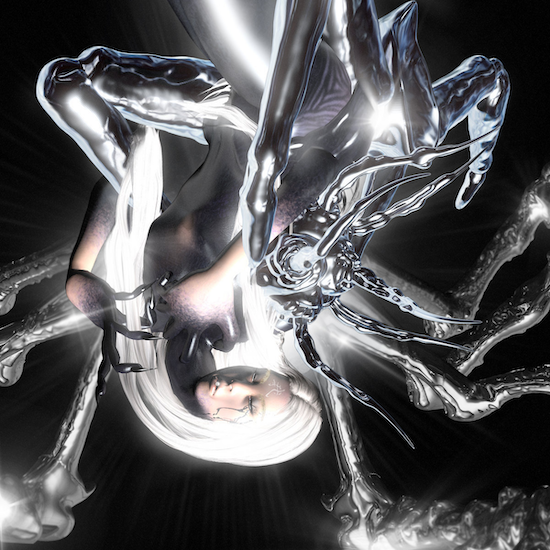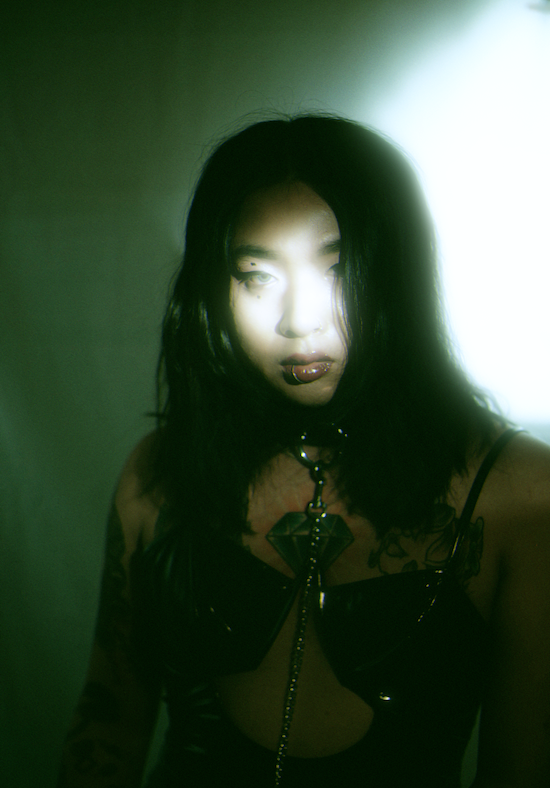Miriam Alegria, aka Wanton Witch, grew up in Tawau, a small town on the coast of Borneo’s Northern Sabah region. It’s a place known for its seafood, as well as the large production of palm oil, tobacco and (especially) cocoa. Wrung out by the colonial projects of the British, Dutch and Japanese empires, nowadays, the Sabah-region is largely leaning on tourism.
Alegria – a trans woman – found it a largely unwelcome environment to grow up in. “There’s nothing going on there,” she shrugs on the other end of a Zoom call. “Not necessarily to a depressing extent, but joy and celebration were not really a thing in my family and my upbringing. I didn’t grow up with a lot of art and music. There was no real influence around me to be honest. I only started exploring myself when I moved away. What affected me most in my music – regarding my upbringing – was more the trauma and the emotional stuff. In terms of musical influences, I grew up not knowing anything.”
One of the few cultural touchstones that did make a mark on Alegria in her youth was the ancient Chinese folk chronicle Journey To The West, specifically its spider spirits: demonic creatures who could assume the form of beautiful and seductive women. A digital effigy depicting Alegria as a spider spirit is shown on the cover of her second self-released album Aku – the Malaysian word for ‘I’ or ‘me’ – suspended in mid-transformation. It’s a strong visual depiction of an artist beginning to properly explore her identity after spending her life in fight or flight mode.
Alegria underscores that she didn’t leave Malaysia to become an artist. She left because she just had to get out. After a period in Kuala Lumpur, she found temporary respite in Bangkok, Thailand. Here she found small communities that aligned more with her headspace, but she didn’t find the city as a whole particularly inclusive. Alegria co-founded the queer collective Non Non Non with fellow artist Mae Happyair, a community of artists who organized parties and workshops. “Back then, in terms of music scenes, it was mostly the indie kids and tech house bros. There was no space for us, nobody was doing the music that I wanted to hear. So I was like ‘Fuck it, I’ll do it myself’.”
Besides DJing at underground Non Non Non-raves, Alegria didn’t really entertain the thought of making her own music until she suffered what she calls a “bad mental meltdown”. As a distraction, she impulsively opened Ableton on her computer and started messing around, with no instruction manual or musical training to act as safety nets. The first two Wanton Witch tracks were spawned. “I did everything by ear and emotion,” Alegria says with pride she tries to mask in trivial jest, a cheerful disposition she maintains throughout the conversation. After releasing the pieces on SoundCloud, she gained near-immediate interest from Berlin-based electronic label Stroboscopic Artefacts. Alegria matter-of-factly describes the whole process, as something that perhaps transpired a bit too straightforwardly.
But nevertheless, the gravitational pull of Wanton Witch is understandable. Calling her self-titled album ‘dark’ and ‘eerie’ would be a severe understatement. It’s an unruly, acrid primal scream transmuted into club music, bludgeoning the listener with jackhammer industrial beats, danger-signal synth barrages and cranked up noise loops. The music urgently simulates the raging adrenaline of a dungeon rave, and it’s pretty awe-inspiring to think that this was Alegria’s first headlong plunge into production, notwithstanding the obvious distress and resentment that spawned it.
“My first album was more about the past. Because when I had my breakdown, all my trauma resurfaced, and I used that to write the album. Aku is more a sequel to that. I look more from the perspective of where I am right now,” Alegria explains, briefly pausing, allowing herself a self-effacing chuckle “…which is still depressing.”

After some goading from her booking agency, Alegria moved to Berlin, where she found a hotbed of artists operating on a similar wavelength. Though it was a welcome departure from her life in Bangkok where she teetered within the margins, Alegria still didn’t want people to be privy to the new music she was creating. “I don’t know why, but with this album, it really means a lot to me. The first album meant a lot too, but it was my first time making music, and I immediately sent it to a label. With this one, I wanted to try and release it myself and do this completely for myself.”
The only track Alegria shared prior to the release of Aku was ‘Inverted Images’, which reveals a different side to Wanton Witch. It’s a haunting, beautiful piece of music that snapshots Alegria’s current emotional state: the joy of embracing herself while gradually learning to let go of all the familiar toils. “Right now, I’m at that crossroads. Even though I have a whole new life here in Berlin, finally doing what I’m supposed to be doing, I have become so used to the pain and struggle. I still don’t know how to move forward mentally and emotionally from that right now.” ‘Inverted Images’ is Wanton Witch composing a wistful pop ballad in this fragile state: the midi-guitar parts sound as if played by a novice, tentative but diligent. Like a monster from a horror movie, discordant beats and hisses barge outside of the door, threatening to invade the tranquil space of the song at any second. It evokes an ever-present, lurking dread.
“‘Inverted Images’ was born out of wanting to write something beautiful for myself,” Alegria says.”And because I have no musical background, making something that is so traditionally structured seems a challenge. Sure, I can throw a bunch of stuff together and make it ‘deconstructed’. But here I wanted to make something that sounded traditional.” ‘Inverted Images’ also marks Alegria’s virgin attempts to implement her own vocals into a Wanton Witch-track. “Ever since I was a kid, I wanted to be a singer. This was also the first time I was using my own vocals in a song. Growing up, I hated my vocals because of how deep my voice is. It’s also beautiful to show that this is my voice, and try to make something beautiful-sounding out of that.”
To those accustomed to Wanton Witch’s first record, ‘Inverted Images’ isn’t the only track that defies expectation. Across Aku’s 11 songs, Alegria shows an uncanny natural talent for melody and composition that complements her chaotic dance music permutations. The marching ‘Eternal Yesterday’ is every bit as sweeping and cinematic as your average sci-fi blockbuster soundtrack. ‘Berceuse For The Dead’ and ‘Too Much To Hope For’ are positively baroque in melody and structure, shapeshifting seamlessly into the violent maelstroms more habitual to Wanton Witch. Much like the spider spirit Alegria so identifies with, the music frantically seesaws between menace and magnificence.
‘Pondan’, meanwhile, reclaims the derisive Malaysian slur against trans and femme-identifying individuals, with Alegria righteously reviving the visceral rhythmic onslaught that marked her older productions. “The whole structure of that track is very unpredictable and chaotic, which is my experience as a tranny. And I feel like ‘Pondan’ gives me a vision of that. There are still beautiful, classical elements within that track.”
Alegria describes herself as a ‘hypersensitive’ person, which might not be the first word that comes to mind when blasting Aku at full volume. Though Wanton Witch explores sonic extremities, the record itself still resonates like an intimate diary entry with titles such as ‘As If You Whisper’ and ‘In The Mirror’ expressing a quiet yearning. “I don’t have a lot of music out because I’m still so new to this. So far everything I make –even this album – is still just about me. I haven’t been influenced by anything else yet, other than myself.”
If she does have any direct influences, Alegria believes they are, if anything, acquired subconsciously. With Aku, she dares herself to work more with widescreen melodies and “cinematic motifs” as she describes them. There is still the menace of her music, but there is also coloir and texture, with more definable orchestral elements like strings and brass. It sounds like an artist slowly exhaling and decompressing from the hypervigilant state that has come to be a default.
“‘Learn To Love’ is literally about me trying to move forward,” Alegria says. “I think over the years I lost the ability to not just love, but to just feel as well.” She explains that most of the days, she is still going through the motions, searching for ways to shake herself from a life deprived of sensation. “The situation right now is okay. I’m surviving every day. It’s more so coming from growing up in Borneo. I’ve been struggling for so long, I don’t know how to shake that. Since I moved to Berlin, I’ve been telling myself I should be going out there meeting people and socialising and making things work for myself. Mentally, I don’t know how to break that cycle of constantly worrying about tomorrow. In this album, I’m telling you where I am. I’m not looking back anymore. But I can’t move forward either, which is what I want to be doing.”


